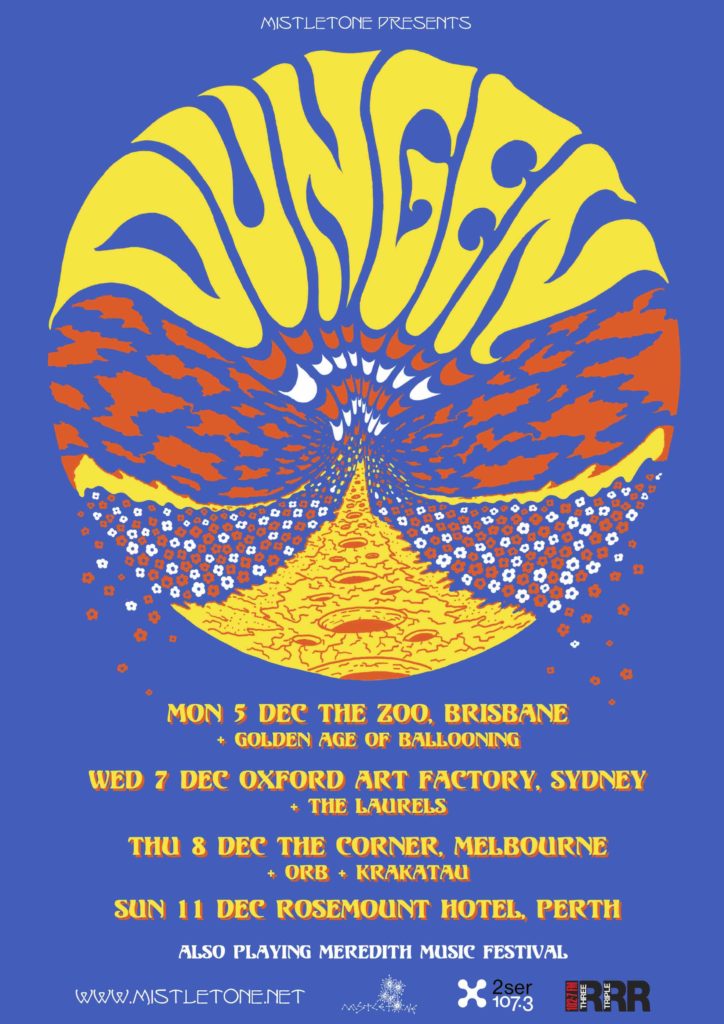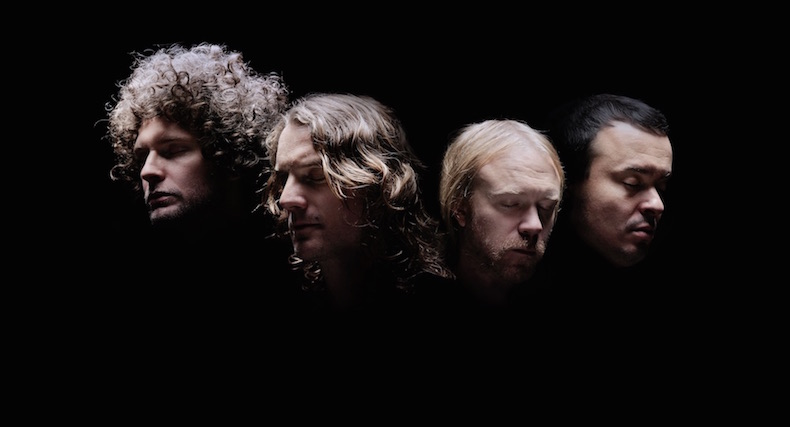Touring: Dungen
By Sophie in News | 0 comments

Artwork by Jason Galea
DUNGEN TOUR DATES:
- BRISBANE: Monday, December 5 @ The Zoo with Golden Age Of Ballooning. Tickets on sale now from Oztix. Presented by 4zzz.
- SYDNEY: Wednesday December 7 @ Oxford Art Factory with The Laurels. Tickets on sale now from Moshtix. Presented by 2ser.
- MELBOURNE: Thursday December 8 @ The Corner with ORB + Krakatau + Psychedelic Coven DJs. Tickets on sale now from Ticketscout. Presented by Triple R.
- MEREDITH: Friday December 9 @ Meredith Music Festival. The Meredith ticket ballot is open now.
- PERTH: Sunday December 11 @ Rosemount Hotel with Nicholas Allbrook, Dream Rimmy + DJ Defs Worthit (Kevin Parker). Tickets on sale now from Oztix.
Mistletone proudly presents Swedish psych rock legends Dungen, touring Australia for the first time since 2006 to perform at the 26th annual Meredith Music Festival plus headline shows in Sydney, Brisbane, Melbourne and Perth.
Dungen have announced a new album called Häxan on Smalltown Supersound. The album is out November 25 as an official Record Store Day/Black Friday release, and the first single from the record is called “Jakten genom Skogen.”
IN BETWEEN the release of Dungen’s most recent two albums (2010’s Skit I Allt and 2015’s Allas Sak), the beloved Stockholm quartet was asked to create an original score to Lotte Reiniger’s 1926 touchstone The Adventures of Prince Achmed, understood to be the oldest surviving full-length animated feature film. Inspired by the nature of the work and the characters portrayed within, the members of Dungen collaborated on themes to represent their take on the film’s narrative, and immersed themselves in the groundbreaking visual language of this landmark film.
Häxan (translation: “The Witch”) is the result of those works, Dungen’s first all-instrumental album, and a continuation of all the things we love about their music. Moody, evocative, stormy, and brimming with life, Häxan provides both a tacit summation of the Dungen journey up to today, and gives the beloved group a chance to stretch out like never before. Here, the psychedelic rock is more bombastic, the softer passages more exquisite, the tension in their musical interplay more dramatic, their intentions remarkably robust. Häxan allows Dungen to move deftly between styles in a more circuitous fashion than their previous works, allowing them to build a story of their own around the action and characters in the film – Prince Achmed, Peri Banu, Aladdin, the Sorcerer, and most of all, the Witch – that reaches beyond the source material, returning to the hooks and melodies that come earlier in the album.
More pronounced collaboration with Häxan’s producer, Mattias Glavå, set the tenor of the sessions, fostered the interstitial moments between tracks, providing a more seamless listening experience. Recorded, mixed, and edited by hand to tape entirely in the analog domain, Häxan was sequenced away from the linear narrative of the film. This process helped to create a path of its own, fully capturing the rawness and spontaneity present in the sessions, as well as a loose, abstract, and fragmented collage feel, evident in the dense and dissonant free-form rock-outs, haunting ambient passages, and gorgeously cinematic soundscapes present in the work. As a result, Häxan works as new, original music by Dungen, both with and without the presence of the film itself.
With Häxan, the indulgences taken by Dungen find new corners in their creative space. “Trollkarlen och fågeldräkten” approaches the excitement of early ‘60s post-bop in a way that the band has yet to reveal until now, with Gustav Ejstes’ attentive piano melody connecting to Mattias Gustavsson’s bass, as Reine Fiske stretches out atmospheric strains of feedback-laced guitar overtop, while drummer Johan Holmegard establishes a busy, polyrhythmic background with a light touch, almost exclusively focused on cowbell and cymbals.
The breezy, groovy theme to Aladdin’s appearances is cut across a handful of Häxan’s runtime, extended to both compact, flute-led bursts of melody, and a more luxuriant synth-based variant. Ejstes applies church organ sternness and harmonic majesty to “Kalifen,” which melts from a stately, Procol Harum-esque introduction into ‘70s soul stabs across a coolly understated rhythmic backing. Elsewhere, “Andarnas Krig,” “Wak-Wak’s portar,” and the title track represent some of the heaviest music Dungen has made to date, recalling the similarly burnt-edged Middle Eastern themes that Agitation Free cut for Vertigo decades ago. “Achmed flyger” ties it all together, with Ejstes and Fiske performing dual piano and synth leads, as the drums and bass surge underneath, creating a driving and focused backing, just as the film’s action begins to take flight.
Most recently, Dungen performed Häxan alongside the film at Mexican Summer’s 2016 Marfa Myths festival, marking its American debut performance. Asked about the experience overall, Gustav says, “In this setting, the movie becomes a solo instrument of its own, and we are simply backing up what we see on the screen. In many ways, it was a liberation to share the focal point with an audience when you’re performing with this kind of accompaniment. It’s a refreshing change to be playing live, and not be the center of attention; it’s the movie instead.”

Dungen‘s mastermind and main songwriter. Gustav Ejstes, has been making music—at first for himself, then eventually and inevitably for all of us—for nearly twenty years. Growing up in rural Sweden, he became obsessed with hip-hop and sampling. Digging through crates and searching for obscure source material provided him with an informal education in ‘60s pop and psychedelia, and soon he learned to play the bits and pieces he was sampling. He took up guitar and bass, drums and keyboard and even flute, then took to his grandmother’s basement to put it all on tape.
When Ejstes recorded his first album, he released it in 2001 under the name Dungen, which means “The Grove”— a nod to his village upbringing or perhaps a deeper reference to American folk songs like “Shady Grove.” While his music has routinely garnered comparisons to acts like Love, Pink Floyd, the Electric Prunes, and Os Mutantes, he has always emphasized a strong sense of songcraft. The music has deep roots in history, but it blooms in the present.
With 2004’s breakout Ta Det Lugnt, Dungen garnered an avid fanbase outside of Scandinavia. Pitchfork lauded the album with a 9.3 and asserted that Ejstes’s “songs are painstakingly arranged with a sense of depth, gradations, and tonal three-dimensionality redolent of something as off the charts as Pet Sounds.” Only on the road did Dungen blossom into a full band, with a rotation of musicians joining Ejstes onstage and eventually coalescing into a fully democratic band that includes Reine Fiske on guitar, Mattias Gustavsson on bass, and Johan Holmegard on drums. Starting with 2007’s Tio Bitar and 2009’s 4, the band members helped Ejstes realize his own vision while adding flourishes of their own. As a result, Dungen grew into something bigger and more formidable: one of the best and most consistently inventive psych rock bands in the world.
At the height of their powers, however, the band took a step back. The five years between 2010’s Skit I Allt and 2015’s Alles Sak was by far the longest interval between releases for a band that proved especially prolific and inspired during the 2000s. During the interim, several members of the band released albums as the Amazing, including 2012’s Gentle Stream and 2015’s Picture You. Ejstes himself co-founded the Swedish supergroup Amason, which includes members of Idiot Wind, Little Majorette, and Miike Snow. They released their debut, Sky City, earlier this year.
Allas Sak picked up where Dungen’s previous album left off, but somehow it sounds bolder and livelier, feistier yet more focused. The four of them jam with greater purpose and principle on songs like the otherworldly instrumental “Franks Kaktus” and the stately “En Gång Om Året,” while the prismatic “Flickor Och Pojkar” and closer “Sova” reveal subtle nuances in the band’s arrangements. Listening becomes an especially galvanizing experience, heady and enlightening. If psychedelic music has often been associated with drug use, for Dungen music itself is the drug: the most effective vehicle for transcendence.
Again, it comes back to the listener. Even as the band continues to grow, the listener remains a constant collaborator, not only inspiring new songs but rejuvenating old ones. “I can definitely feel a new significance in some of our older songs, mainly because of the people we’ve met and the stories about their own experiences with the music.”
- “I love Dungen” – Kevin Parker, Tame Impala, who has acknowledged Dungen as his major influence.
Fun Tame Impala fact: In 2007, a young Kevin Parker got in touch with Dungen and sent them through his latest recording, asking them to mix it. The band’s response? “No, we don’t have to mix it! Just put it out! It’s amazing as it is!” Prescient.
email this | tag this | digg this | trackback | comment RSS feed
Post a Comment